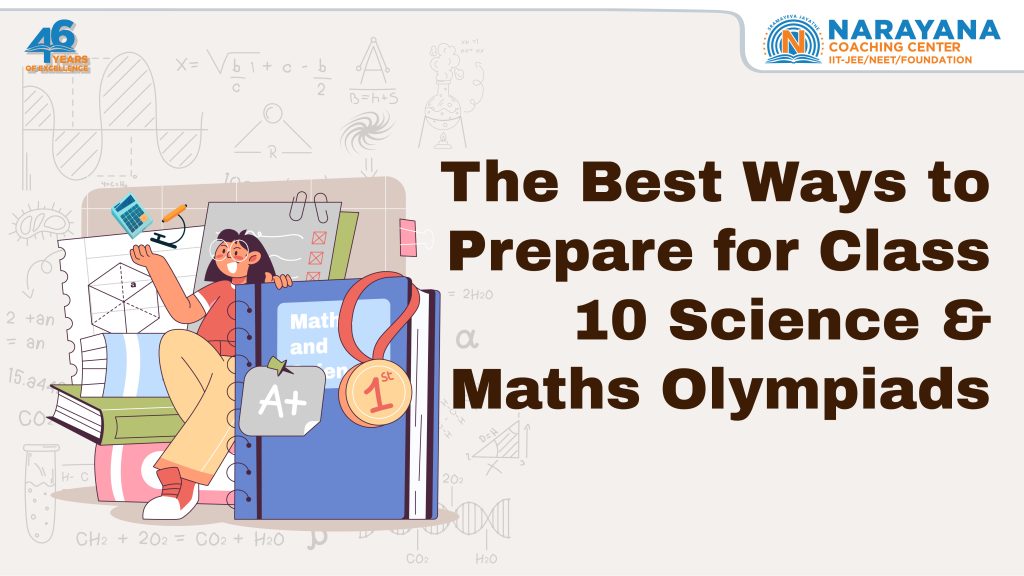
Participating in Science and Math Olympiads at the Class 10 level can be a transformative experience, both academically and personally. These competitive exams are designed to challenge your conceptual understanding and problem-solving abilities. With the right strategies and disciplined preparation, students can excel and secure top ranks. Here’s a comprehensive guide to help you prepare effectively.
1. Understand the Olympiad Structure
Before diving into preparation, understand the format, syllabus, and types of questions asked in various Olympiads, like:
- National Science Olympiad (NSO)
- International Mathematics Olympiad (IMO)
- Indian National Junior Science Olympiad (INJSO)
- Regional Mathematical Olympiad (RMO)
These exams often test logical reasoning, application-based questions, and deep conceptual understanding.
2. Analyze the Syllabus Thoroughly
While Olympiad syllabi usually align with your school curriculum, they often go deeper into concepts. Refer to:
- NCERT Class 9 and 10 books
- Previous year Olympiad papers
- Official websites for detailed syllabus outlines
3. Use the Right Study Material
Invest in specialised books that are tailored for Olympiad preparation:
- MTG Foundation Course Series
- Arihant Olympiad Books
- Pearson IIT Foundation Series
Online platforms like Olympiad Success and SOF World also offer extensive question banks and mock tests.
4. Create a Smart Study Plan
Divide your preparation into manageable phases:
- Concept Clarity Phase: Focus on building a strong foundation
- Practice Phase: Solve application-based questions and sample papers
- Revision Phase: Revise important topics, formulae, and shortcuts
Allocate daily time slots for Science and Math, alternating between topics to maintain engagement.
5. Practice Previous Year Papers
Solving past Olympiad papers helps you understand question patterns and difficulty levels. It also enhances time management skills. Analyze your mistakes and work on weak areas.
6. Take Timed Mock Tests
Simulating the exam environment with mock tests is crucial. Use timers to simulate real-time pressure. This improves your speed and accuracy.
7. Focus on Conceptual Understanding
Avoid rote learning. Focus on understanding:
- Scientific principles
- Mathematical theorems and logic
Use real-life analogies, experiments, and visual aids like diagrams and flowcharts to internalize concepts.
8. Strengthen Logical Reasoning
Most Olympiads include sections on analytical and logical reasoning. Practice regularly with puzzles, Venn diagrams, number series, and logical statements.
9. Join Online Forums and Peer Groups
Being part of Olympiad communities can boost motivation. Engage in:
- Online discussion forums like Quora, Reddit
- Telegram or WhatsApp groups
- School or coaching study circles
Sharing insights and solving doubts collaboratively can enhance your understanding.
10. Consult Experts and Teachers
Seek guidance from mentors, teachers, or Olympiad alumni. Their experience can help you with effective strategies and common pitfalls to avoid.
11. Make Concise Notes
While studying, make short notes of:
- Key formulae
- Important definitions
- Tricks and shortcuts
Use these for quick revisions before exams.
12. Use Digital Tools and Apps
Leverage technology to make learning engaging:
- Apps like BYJU’S, Unacademy, and Toppr for conceptual videos
- Online quizzes and interactive lessons
These platforms offer personalized learning paths and progress tracking.
13. Stay Consistent and Motivated
Consistency trumps cramming. Stick to your schedule and reward yourself for small milestones. Keep the bigger goal in sight to stay inspired.
14. Manage Your Time Effectively
Balance school, Olympiad prep, and relaxation. Use tools like to-do lists, planners, and time-blocking methods to stay organized.
15. Take Care of Your Health
A healthy body supports a sharp mind. Ensure:
- Adequate sleep (7-8 hours)
- Nutritious diet
- Regular exercise and hydration
Avoid burnout by taking short breaks and practising mindfulness.
Conclusion
Cracking Class 10 Science and Math Olympiads requires more than just hard work—it demands smart, strategic preparation. Start early, stay consistent, and keep refining your approach with each practice session. With the right mindset and resources, achieving Olympiad excellence is well within your reach.
FAQs
Q1: How early should I start preparing for Olympiads?
Start at least 6-8 months in advance for in-depth preparation.
Q2: Are NCERT books enough for Olympiad preparation?
They are a strong base, but additional practice from Olympiad-specific books is essential.
Q3: How many hours should I study daily for Olympiad exams?
2-3 focused hours daily, depending on your current preparation level.
Q4: Can I prepare for Olympiads without coaching?
Yes, with self-discipline, the right resources, and a smart study plan.
Q5: What’s the best way to revise before the Olympiad?
Use your self-made notes, solve mock tests, and focus on weak topics.
